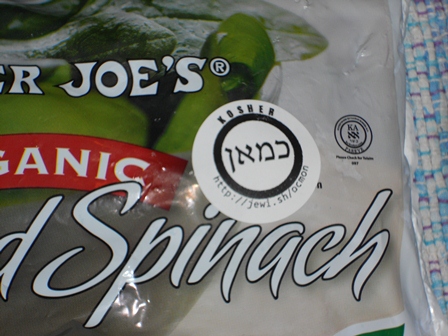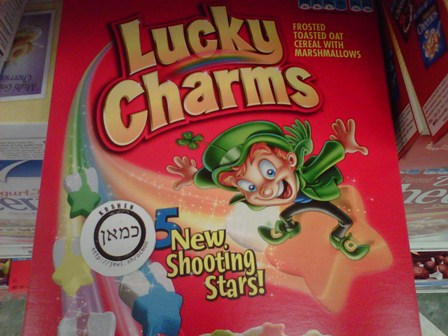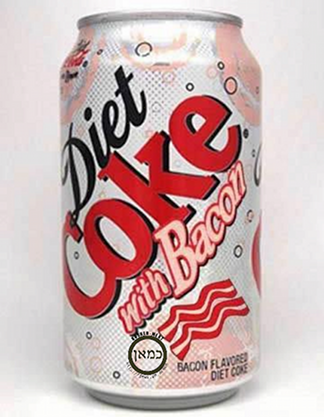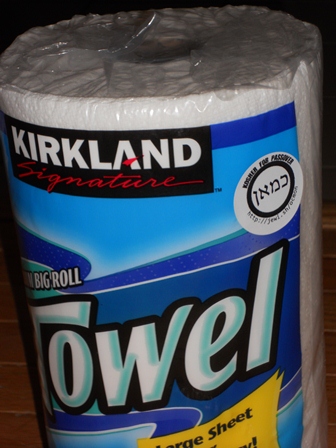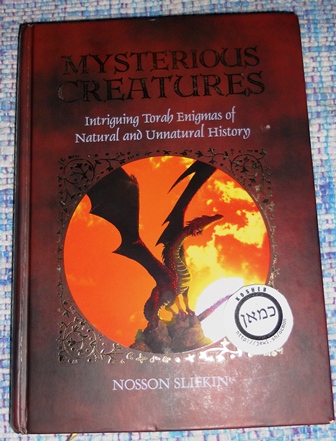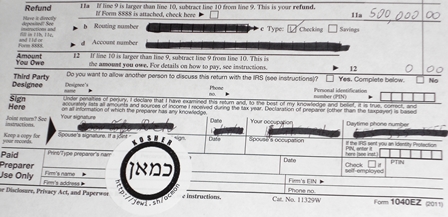I visited the link shown on that symbol
(http://is.gd/ocmon) and discovered the
following FAQ written by the hechsher’s originators (copied here with
permission):
O-Cmon FAQ
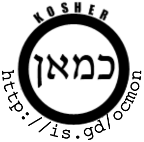
What is the O-Cmon?
The O-Cmon is the world’s first crowd-sourced Kosher certification.
Like Wikipedia or
Mi Yodeya, we take
advantage of the wisdom, efforts, and interests of the crowds to
generate high-quality kosher certification on a wide variety of
products with very low organizational or procedural overhead.
Unlike the legacy hechshers, which flow halachic authority down from
centralized posekim to
professional field personnel to products to consumers, the O-Cmon
flows the authority sideways, from consumers, or rather,
pro-sumers to products and
each other. Instead of relying on expensive inspection processes and
time-consuming Halachic research, the O-Cmon takes advantage of each
prosumer’s God-given common sense and Jewish knowledge.
What do the name and symbol mean?
The O-Cmon symbol can be read in either English or Aramaic to pose two
questions that it empowers you to answer:
Oh, c’mon! How could this not be kosher? Of course, it is!
?כמאן - Says who? Says me!
Who is behind the O-Cmon?
You, the prosumer, are behind the O-Cmon. You decide what to apply
it to, and why.
The team facilitating the great certification work that you do for the
O-Cmon is:
Rabbi Benny Neviim, Chief Rabbinic Visionary Officer
Rabbi Chezzi Polk, Chief Rabbinic Crowd Instigation Officer
How was the O-Cmon founded?
Rabbi Neviim is a big fan of the crowd-sourced Jewish Q&A site
Mi Yodeya, where a
crowd of people who base their lives on Jewish law and tradition ask
great questions and provide each other with fast, interesting,
well-sourced, peer-reviewed answers. The main problem he sees with
that site is its old-fashioned
insistence that it “does
not offer professional (particularly rabbinic) advice” and that users
should
consult their own Rabbi for personal, practical guidance.
Rabbi Neviim saw the need to go one step further in taking advantage
of the wisdom of the crowd. Instead of just getting discussion and
information from other prosumers, he reasoned, why not get
full-fledged Halachic decisions from them? Rabbi Neviim then joined up
with Rabbi Polk, a world-renowned expert in empowering members of the
community to make and promulgate their own decisions.
How can I use the O-Cmon?
1) Download any of the following graphics.
NOTE: If you have labels bearing our old web address, which started "jewi.sh", please discard them, as that link doesn't work anymore.

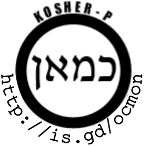
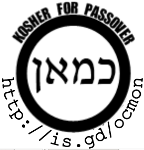
2) Find products or services that you feel aren’t getting the kosher
certification they deserve. This includes products or services that
you produce yourself, and that the legacy hechshers would therefore
never touch. One example of this latter category would be your
home-made Mishloach
Manot packages.
3) Affix the O-Cmon label to these products and services.
4) (Optional, but recommended) Post a photo of the newly-certified
product to the O-Cmon’s home page and to your
social networks, so that your friends can benefit from your applied
expertise.
Legal Notices
Unlike the typical legacy hechsher, which wraps its symbol in
trademark protection and hires aggressive litigators to hound anyone
who uses the symbol without the Draconian rules handed down from on
high by the hechsher’s central authorities, the O-Cmon promotes public
sharing of its certification by:
Releasing all of its materials under a Creative Commons BY-SA
3.0 license. That
means that prosumers are welcome to reuse and remix the O-Cmon as long
as they acknowledge where it came from (which the link to our home
page on the bottom of the symbol takes care of) and agree to share
their work with other prosumers.
Making its home page a community-editable
wiki, so that even the information about the O-Cmon itself can benefit
from the wisdom of the crowd.
Please do not adhere O-Cmon stickers to products that you do not own. Unfortunately, the prosumerist movement that we are trying to promote has not yet been adopted widely enough yet, so your educational impulse is likely to be considered vandalism by the products' owners. In addition, consumers who encounter the product may mistakenly think that it's certified by an actual hechsher, rather than a Purim joke.
